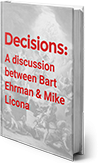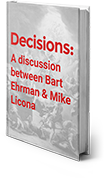“The Intrinsic Flaws Inherent in Christianity”
A Critique of the Essay “The Intrinsic Flaws Inherent in Christianity”
“The Intrinsic Flaws Inherent in Christianity” is a short essay that is a collection of four standard objections to Christianity: 1.
Based on these, the essayist concludes that Christianity is “a fundamentally flawed religion.” We’ll look at each of these arguments, considering both the particulars as well as the logic behind them. We’ll refer to the essayist as Sam the Skeptic.
All Rights Reserved. No reproduction of any kind permissible without the expressed written consent of the publisher.
Sam’s first objection is that Christianity cannot be proven. There are many areas of science that cannot be proven. Does this fact render the sciences fundamentally flawed? We must consider all of the available data and make a judgment, according to certain criteria, of which explanation best accounts for that data. For example, which explanation takes into account more of the data, does so easily, without strain, does not require a reality different than that which we know, and does not appear to have much likelihood of being overturned by future data. We must also ask Sam what he means by proved. Does he understand that there are different degrees of confidence? Does he require 100% certainty before he considers something as proved? If so, our knowledge of the past would be reduced from libraries to pages and our scientific enterprises reclassified to science fiction, since very little science has that much certainty.
Something Sam fails to consider is the large amount of evidence that exists supporting the truth of Christianity: Philosophical arguments for an eternal cause of the universe; Arguments for an intelligent Designer of the universe and life resulting from discoveries over the past 40 years in astrophysics and molecular biology. These are other debates. However, the data is compelling enough to have led a number of prominent atheist scientists and philosophers to belief in God; Double-blind medical experiments on prayer, the results of which have been published in professional medical journals; Near Death Experiments (NDEs) corroborated by physicians where the patient had a flat EKG or EEG. Even the prominent atheist philosopher A. J. Ayer documented an NDE he experienced and could not explain in natural terms; Finally, the resurrection of Jesus has surprisingly good historical evidence in its favor. Thus, Sam is mistaken in his first conclusion that if Christianity cannot be proved, it is fundamentally flawed.
Sam’s second argument concerns the hypocrisy of many Christians and says this renders Christianity as fundamentally flawed. Sam observes that many Christians “live by different morals than are preached by the most holy texts.” Can we judge a philosophy by its abuse? Since hypocrites exist in every worldview, be it Christianity, atheism, Islam, Hinduism, Buddhism, etc., hypocrisy in the Church only testifies to the fact that Christians are flawed. It does nothing to demonstrate that Christianity is fundamentally flawed, as Sam claims.
Sam’s third argument concerns purported contradictions in the Bible. Christian philosopher Norm Geisler has made a hobby of collecting alleged discrepancies, inaccuracies, and conflicting statements in the Bible. He has a list of about 800, many of which he answers in his book When Skeptics Ask. This short essay is not the place to deal with these. However, let’s consider his first purported contradiction followed by what he believes the most damaging one. The first contradiction concerns the Christian belief that all humans are created equal and yet the Bible teaches that wives should be subordinate to their husbands. I realize that the very issue of female subordination in marriage raises negative emotions in modern Western culture. It is not my objective to address the matter here, since I’m only attempting to provide a brief critique of Sam’s essay that is near equal length to the essay itself. Thus, I’m only concerned for the moment in addressing the assertion that this is a contradiction. In the Declaration of Independence for the U.S.A. it is stated that “all men [read people] are created equal.” In our military and corporate America, authority structures exist. This does not nullify or supersede the teaching of the Declaration of Independence. We can distinguish between ontological and functional equality. Ontological equality concerns the essential equality of persons, whereas functional equality concerns that of position. The President of the United States of America has no more intrinsic value than I do. Thus, there is ontological equality. However, he holds a position of authority much greater than my own. Thus, functional equality is absent. On the other hand, if we are comparing the U.S. President with the Prime Minister of the U.K., functional equality is present. Thus, the President and Prime Minister share ontological and functional equality, whereas I only share ontological equality with these leaders. It is noteworthy that this is the Christian teaching regarding the Trinity. The Father, Son, and Holy Spirit are ontologically equal, whereas the Son and Holy Spirit are subordinate to the Father. This is precisely what we have when we come to the Biblical teaching of the subordination of wives in marital relationships. Ontological equality exists between the husband and wife, whereas functionally the wife is subordinate to her husband. Again, I am not, for purposes of this essay, interested in discussing modern Western objections to this Christian position; only that it is not contradictory.
Before moving on to what Sam considers to be his most promising example, I would like to make one other point which, in my judgment, is the most problematic for Sam’s contention that contradictions in the Bible reveal that Christianity is fundamentally flawed. Let us suppose for a moment that Geisler and others like him are wrong and that errors and contradictions exist in the Bible. Does this merit the conclusion that all of its contents are questionable? Do we apply this same standard to other ancient sources such as the Roman historians or even modern university textbooks? Here’s the point: Even if Sam is correct in terms of the purported contradictions he cites-and as we’ve noted with the one we considered, he is not-this third argument does not merit the conclusion that Christianity is fundamentally flawed, since even if the Bible contained numerous errors and contradictions, it could still be largely trustworthy.
In fact, the Smithsonian Institution has produced an official statement titled The Bible as History that can be requested through its Department of Anthropology, National Museum of Natural History. This document states that many of the books of the Bible “are as accurate historical documents as any that we have from antiquity and are in fact more accurate than many of the Egyptian, Mesopotamian, or Greek histories. These Biblical records can be and are used . . . in archeological work. For the most part, historical events described took place and the peoples cited really existed.” Moreover, historical Jesus research has revealed much that the historian can conclude with a high degree of historical confidence regarding Jesus’ deeds and teachings and, as stated earlier, the historical evidence for Jesus’ resurrection is quite strong. Thus, irrespective of potential problem passages, the conclusion that Jesus rose is still strongly evidenced and that is the bedrock of Christianity. Accordingly, a Christian could feel confident in saying, “I don’t know how to answer your alleged contradiction now, though given some time I could see how others do. But Sam, even if you have found a mistake in the Bible, it doesn’t change that Jesus rose from the dead, an event that confirms Christianity.”
Sam believes his strongest example of a contradiction has to do with God’s omniscience and omnipotence. If he is omniscient as the Bible claims, he would know all possible worlds before creating them. By creating our world, he already knows the outcome of every deed and, thus, our world and all of its events are in a sense predetermined. Thus, Sam claims freewill does not exist. Moreover, if the Christian God is omniscient, he knows his own future and does not have the power to change it. Thus, his omniscience is in conflict with his omnipotence. Accordingly, even if God could change his future, he would not have seen this as his future prior to making the decision to change. This would prohibit him from being omniscient. Thus, omniscience and omnipotence are incompatible.
God cannot do logically contradictory things. For example, he cannot draw a square circle or create a married bachelor. Neither can he create a rock bigger than he can lift since this would be contradictory. Perhaps Sam would reply that if God is omnipotent, he would be able to do even things that are contradictory. In that case, we might argue that an omnipotent God would proceed to create a rock bigger than he could lift and then lift it. When Sam responds that this is a contradiction in statements, we could answer that this should not be a concern for him since he holds that an omnipotent God can do even things that are contradictory. If free beings are involved, even if God knows everything that will occur from beginning to end, such foreknowledge does not negate the free will of those making the choices. They are still exercising their free will and God knows rather than determines what they will choose. Even if God knows every detail of a million potential worlds before creating the one he chose, this does nothing to negate the free will of those making the choices within that world. But does his foreknowledge stand in conflict with his omnipotence? Only if one holds that omnipotence means being able to do logically contradictory acts, since God can know what a person will do while allowing change. If Sam does, as with the rock God creates and then lifts, there is no problem. However, if Sam does not, logically contradictory acts do not compromise omnipotence and no problem exists. Either way, Sam’s most damaging example does nothing to challenge the character of God, much less the truth of Christianity.
Sam’s fourth and final argument is the problem of evil, first stated by Epicurus around 300 years before Jesus.
The problem with this syllogism lay in the first premise. How do we know that an all-good and all-powerful God could and would create a perfect world? What if he desired a world of free beings? Is it logically certain that an all-powerful God can create a world of free beings, all of whom choose to do right all of the time? I see no reason to think this is logically certain, probable, or even possible. Without logical certainty, the first premise cannot be stated as fact and this argument loses its punch. Without logical probability, the argument fails. Without logical possibility, it fails miserably. Moreover, it could very well be that God created a world of free beings, optimized for the greatest amount of good and the least amount of evil in such a world. Even without this final consideration, Sam’s fourth argument fails.
In conclusion, we’ve seen that each of Sam the Skeptic’s four arguments is flawed in its presentation of the specifics as well as the logic upon which it is based. Thus, Sam’s conclusion that Christianity is fundamentally flawed fails.
- If God is all-good and all-powerful, he could and would create a world where no evil exists.
- Evil exists.
- Therefore, an all-good and all-powerful God does not.
- Christianity cannot be proved.
- Hypocrites exist in the Church.
- The Bible is contradictory.
- The Problem of evil.





